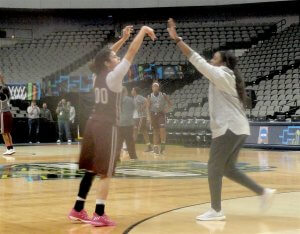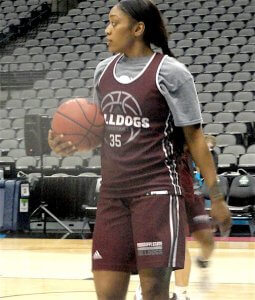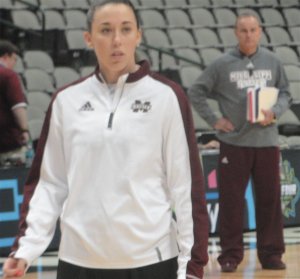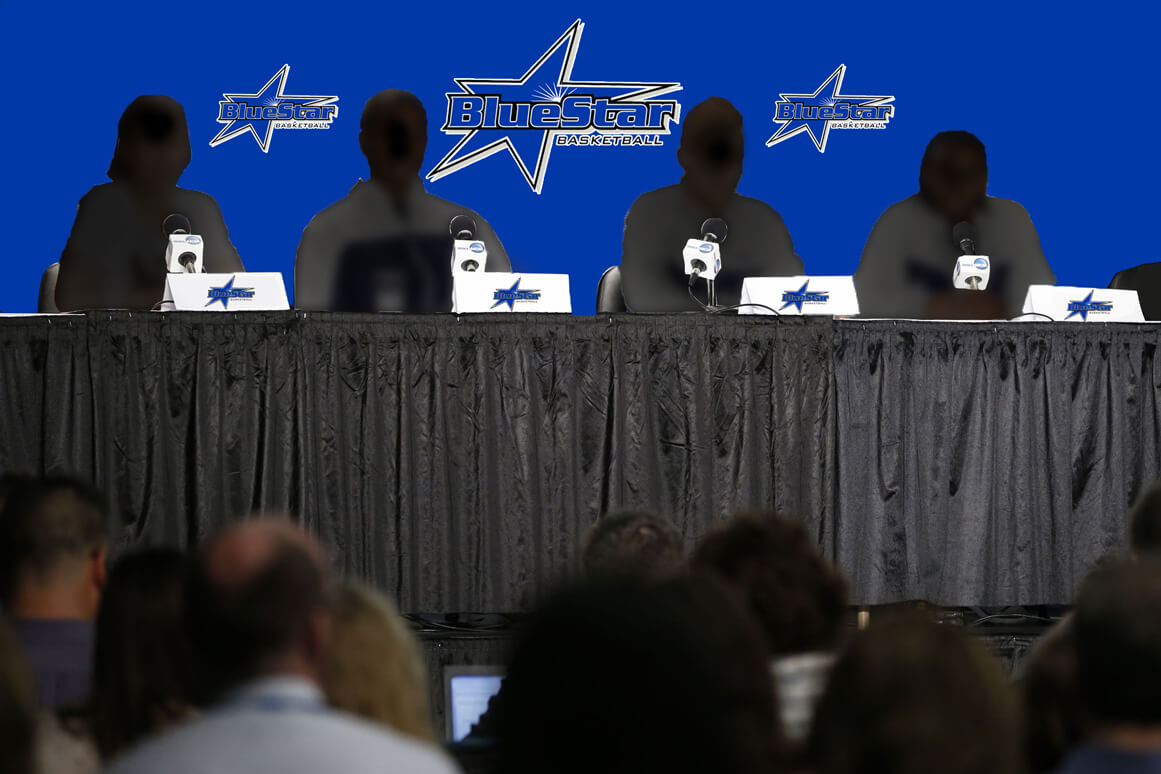DALLAS–The arrival of Mississippi State at the Women’s Final Four took place sooner than Vic Schaefer thought it could when got the head coaching job five years ago.
What’s been just as impressive is the explosion of interest from one of the fastest-growing fan bases in the country, and in a small region to draw from.
The evolution of a once-floundering program into one of the nation’s elite draws upon a rich in-state heritage of female basketball that goes back many decades.
“Certainly I envisioned it. I’m not sure I envisioned it in five years,” Schaefer said of his team’s march to the Women’s Final Four. “I never would have come to Mississippi State if I didn’t think we could do it here.”
The Bulldogs (33-4), who face four-time defending national champion Connecticut Sunday at American Airlines Center, are the first team from Mississippi to reach an NCAA Women’s Final Four.
As they’ve vaulted into national prominence, they’ve learned some rugged lessons about what’s needed to keep climbing, and to stay there. A year ago, they were pounded 98-38 by UConn in the Sweet 16, prompting Schaefer to compare the Huskies to “piranhas on a roast.”
After a lackluster end to the current regular season, and with a couple weeks in the gym to prepare before the NCAAs, Schaefer shook up his starting lineup, and got his players’ attention.
A team that scored 49 points in losing to South Carolina in the SEC Tournament finals has twice eclipsed the 90-point mark in the NCAA tourney, including an overtime win over No. 1 seed Baylor.
“We’ve grown as a team since last year,” said Bulldogs point guard Morgan William, who scored 41 points against Baylor. “Last year, we were a little timid to go out there [against UConn] and compete. This year, I feel a little different vibe, that we can go out there and compete with them.”
For most of its history, Mississippi State has languished not only in the SEC, but in its own state, the result of dominance from other schools as well as the victim of neglect.

Senior Dominique Dillingham has been an important leader for Mississippi State. (Photo: Wendy Parker)
A state that produced Lucy Harris and the stars of the Delta State AIAW national championship teams in the late 1970s and the Gillom sisters, who flourished at Ole Miss a decade later, also has been the home turf for former Mississippi State standouts LaToya Thomas and Tan White.
“In the South, there are places where girls and women’s basketball has a very different level of importance,” said former Georgia coach Andy Landers, now an ESPN studio analyst. “Mississippi is one of those places.”
When Schaefer was hired after many years of serving as Gary Blair’s “Minister of Defense” at Arkansas and Texas A & M, the Bulldogs had become respectable under Sharon Fanning-Otis.
What was missing was the kind of institutional support needed to compete with SEC rivals and beyond. Former athletics director Scott Stricklin made the call to Schaefer, and a program that Landers dubbed “a sleeping giant” began to transform, although not right away.
The Bulldogs were 13-17 in Schaefer’s first season, and the year after that, they won 22 games. But in both of those years they were only 5-11 in the SEC.
“Those kids that we inherited, we kept every one of them,” Schaefer said. “We didn’t get rid of anybody. We asked them to change, and they did. I give those kids a lot of credit.”
It was after that second season that his recruiting efforts, led by associate head coach Johnnie Harris (another former Texas A & M assistant under Blair), also began to bear fruit, with one of the key components being home-grown.

Victoria Vivians was a crucial home-state recruit for Mississippi State’s rebuilding under Vic Schaefer. (Photo: Wendy Parker)
When the Bulldogs signed guard Victoria Vivians, who scored more than 5,700 career points at Scott Central High School, Mississippi State had persuaded a heavily prized local talent to stay close to home.
Her hometown of Carthage, Miss., is located in the smack dab middle of the state, and boasts the world’s largest chicken processing plant.
Players like Vivians who’ve come from towns like hers (as do many of her teammates from Texas, Arkansas, Georgia and Alabama) have helped build fan appeal with Mississippi State supporters who’ve turned out in phenomenal fashion.
Even as she was becoming the second all-time career scoring leader in SEC history, Thomas didn’t play before many home crowds at Humphrey Coliseum that topped a couple of thousand.
These days, Mississippi State is in the Top 10 nationally in attendance, averaging 6,641 during the regular season. The Bulldogs also had one the best gates in early-round NCAA games, pulling in 6,035 on a Friday afternoon in their 92-71 win over DePaul.
“You can count on one hand and two fingers where else that’s happening across the country,” Schaefer said. “But that’s part of building a program. When you go build a program, it’s not just about Xs and Os and wins and losses. It’s about a fan base.”
It’s a fan base Schaefer, his staff and players have worked diligently to cultivate, and it’s an ideal blueprint for the kind of grassroots marketing efforts that many women’s programs, even in power conferences, aren’t undertaking.
The historical connections in Mississippi are worth noting. Langston Rogers, who was the sports information director at Delta State in the 1970s, is a longtime Women’s Final Four media staffer. He told me that the Lady Statesmen often sold out their 4.500-seat arena and became so popular that men’s games were played beforehand so crowds wouldn’t leave before the men tipped off.
The Lady Statesmen were a big draw in some of the early women’s showcase games during that era, pulling in 11,000 for a game at the Superdome against LSU during Sugar Bowl week festivities, as well as nearly 12,000 in Madison Square Square Garden.
Those were the days long before television saturation and event marketing, when fans of small-town or remote schools gladly traveled to see their teams play in person. Getting them to do so today is a more challenging endeavor.
The “Golden Triangle” that comprises Starkville, Columbus and West Point in northeastern Mississippi has a population of less than 130,000. Tupelo is about an hour away, the state capital of Jackson almost a three-hour drive.

Vic Schaefer, who hired Carly Thibault to his staff this season, has tirelessly promoted his team across Mississippi. (Photo: Wendy Parker)
Schaefer’s traveled much of the state to speak before clubs, church and youth groups and chambers of commerce. During the season, a weekly luncheon for boosters and other fans forges even stronger ties.
“We go in the stands after every game. We’re hugging babies and kissing mamas or vice versa,” Schaefer said. “Whatever it takes. But that’s what we do. In this game, that’s easy. But I call my team the people’s team because everybody that comes, they want to hug them, tell them how much they love them. They want to feel a part of the team. That’s what makes our game so special.”
Rick Cleveland, a longtime sports journalist in Mississippi, told me the Bulldogs’ trip to the Women’s Final Four is a “huge” story in a state that loves winners, but hasn’t always had much to cheer about. It’s been 21 years since Mississippi State’s men’s team reached the Final Four.
With no major professional sports, and with a blue-collar identity forged through Schaefer’s emphasis on defense, Mississippians have taken to a team that wins, but also plays the game a certain way.
“I think the people in our community can identify with that,” Schaefer said. “They want to show their daughter, I want you to play like Dominique Dillingham. I want to play fearless and step in front of a freight train and take a charge. I want to see you compete like they compete.
“That’s how you build a program.”
Mississippi State isn’t being given much of a chance of stopping a 36-0 UConn team that’s having an astounding season even by its own ridiculous standards.
But as the Bulldogs insist that one humiliating game a year hasn’t derailed them, neither will another matchup with the game’s biggest name, one that’s putting an 111-game winning streak on the line with a shot at playing for an NCAA title.
“We know what’s in front of us. . . We’ve grown a lot from that day,” Schaefer said. “These kids have earned the right to be here, make no mistake about it.”
Wendy Parker is a sportswriter and web editor who has covered women's basketball since the early 1990s. She is a correspondent for Basketball Times and formerly covered women's and college sports, soccer and the Olympics at The Atlanta Journal-Constitution. She is the author of "Beyond Title IX: The Cultural Laments of Women's Sports," available on Amazon, and the creator of Sports Biblio, a blog about sports books and history.




